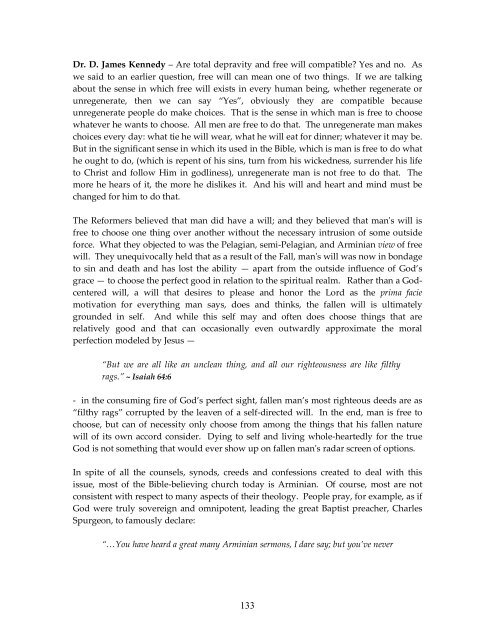AG STUDY GUIDE FINAL - The Forerunner
AG STUDY GUIDE FINAL - The Forerunner
AG STUDY GUIDE FINAL - The Forerunner
Create successful ePaper yourself
Turn your PDF publications into a flip-book with our unique Google optimized e-Paper software.
Dr. D. James Kennedy – Are total depravity and free will compatible? Yes and no. As<br />
we said to an earlier question, free will can mean one of two things. If we are talking<br />
about the sense in which free will exists in every human being, whether regenerate or<br />
unregenerate, then we can say “Yes”, obviously they are compatible because<br />
unregenerate people do make choices. That is the sense in which man is free to choose<br />
whatever he wants to choose. All men are free to do that. <strong>The</strong> unregenerate man makes<br />
choices every day: what tie he will wear, what he will eat for dinner; whatever it may be.<br />
But in the significant sense in which its used in the Bible, which is man is free to do what<br />
he ought to do, (which is repent of his sins, turn from his wickedness, surrender his life<br />
to Christ and follow Him in godliness), unregenerate man is not free to do that. <strong>The</strong><br />
more he hears of it, the more he dislikes it. And his will and heart and mind must be<br />
changed for him to do that.<br />
<strong>The</strong> Reformers believed that man did have a will; and they believed that man's will is<br />
free to choose one thing over another without the necessary intrusion of some outside<br />
force. What they objected to was the Pelagian, semi-Pelagian, and Arminian view of free<br />
will. <strong>The</strong>y unequivocally held that as a result of the Fall, man's will was now in bondage<br />
to sin and death and has lost the ability — apart from the outside influence of God’s<br />
grace — to choose the perfect good in relation to the spiritual realm. Rather than a Godcentered<br />
will, a will that desires to please and honor the Lord as the prima facie<br />
motivation for everything man says, does and thinks, the fallen will is ultimately<br />
grounded in self. And while this self may and often does choose things that are<br />
relatively good and that can occasionally even outwardly approximate the moral<br />
perfection modeled by Jesus —<br />
“But we are all like an unclean thing, and all our righteousness are like filthy<br />
rags.” ~ Isaiah 64:6<br />
- in the consuming fire of God’s perfect sight, fallen man’s most righteous deeds are as<br />
“filthy rags” corrupted by the leaven of a self-directed will. In the end, man is free to<br />
choose, but can of necessity only choose from among the things that his fallen nature<br />
will of its own accord consider. Dying to self and living whole-heartedly for the true<br />
God is not something that would ever show up on fallen man's radar screen of options.<br />
In spite of all the counsels, synods, creeds and confessions created to deal with this<br />
issue, most of the Bible-believing church today is Arminian. Of course, most are not<br />
consistent with respect to many aspects of their theology. People pray, for example, as if<br />
God were truly sovereign and omnipotent, leading the great Baptist preacher, Charles<br />
Spurgeon, to famously declare:<br />
“…You have heard a great many Arminian sermons, I dare say; but you’ve never<br />
133


